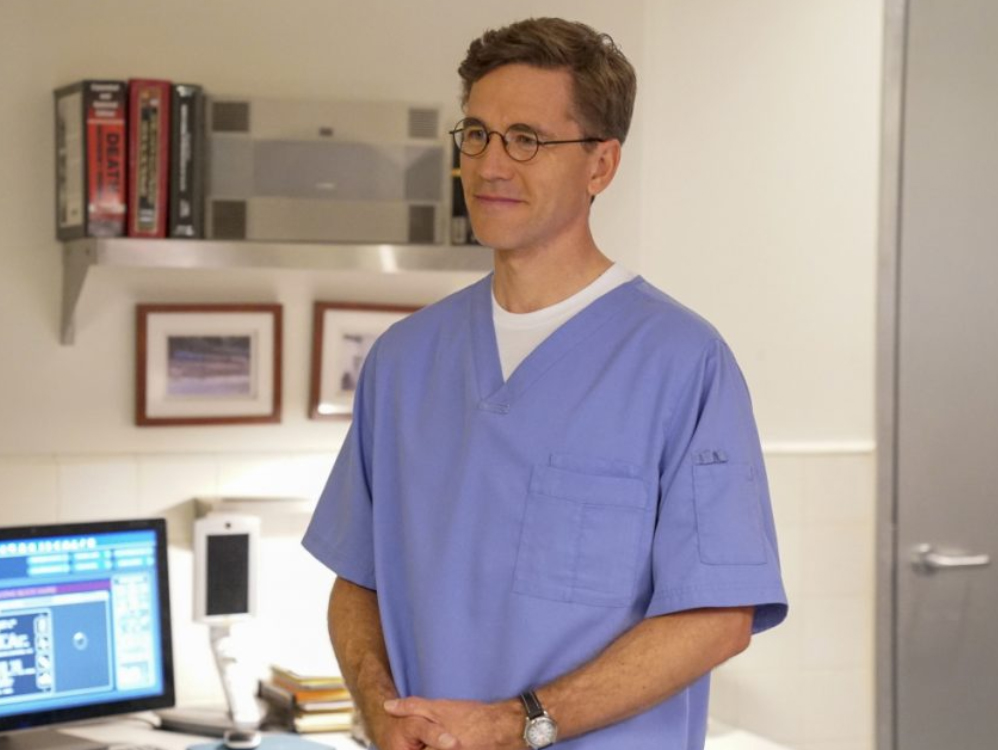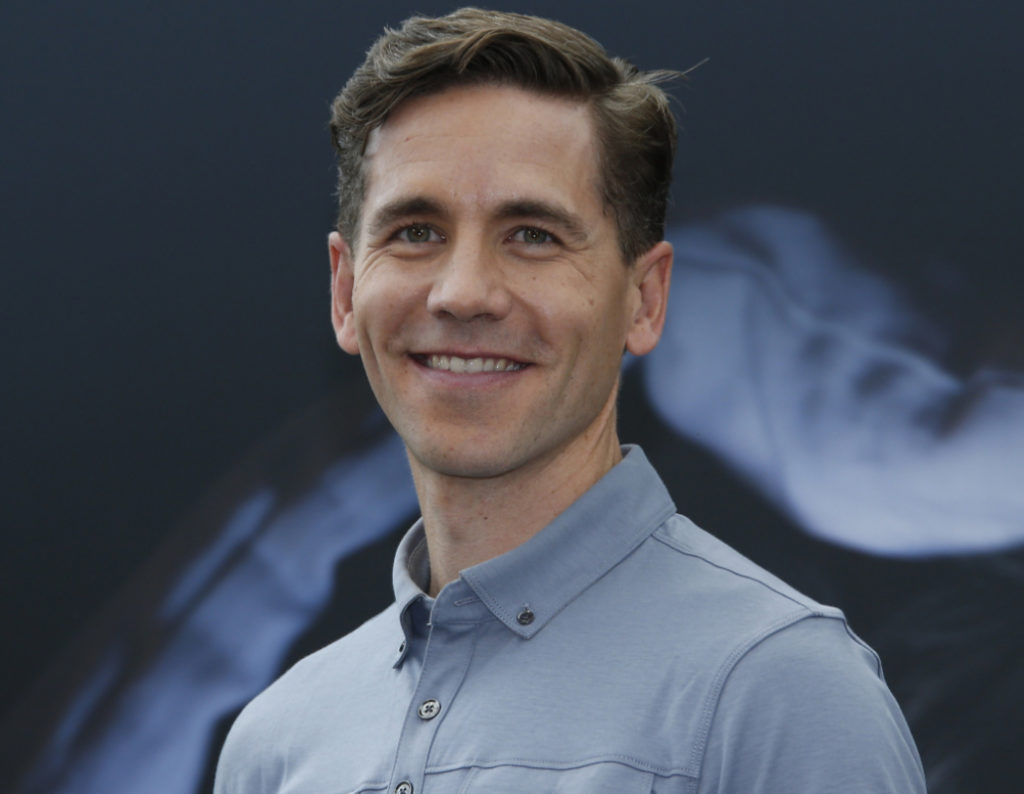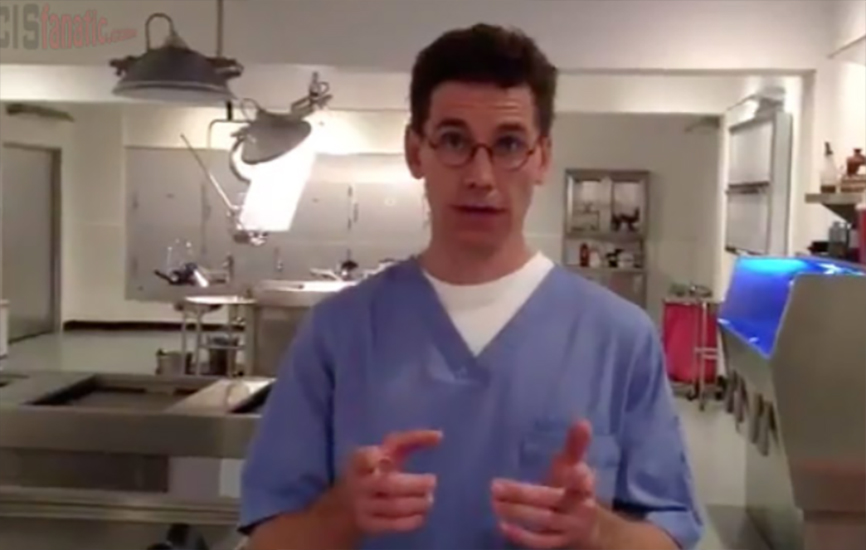After some trepidation about pushing the prospect, he achieved his goal of creating an original episode: “We have one of the most talented writing staffs on television, so I thought that might be seen as hubris.” A stroke he had helped to put an end to it.
If there’s been an underdog on “NCIS” throughout its 19 seasons, it’s been Brian Dietzen’s nervous, happy-go-lucky guy in glasses down in autopsy, who’s long done a lot with less screen time than some of the characters who aren’t lab-bound.
“People were sleeping on Jimmy Palmer, man,” says Diona Reasonover, who plays Kasie Hines and has a lot of interaction with him on the hit show. “He’s like the undercover sniper of everyone’s favorite characters.” When they’re listing their favorite characters, he’s always in the top three.”
It’s not just about likability: After initially undervaluing Palmer’s character. “NCIS” may have given him the most significant character arc of any character on the show. “When I got onto the show on season 9, he was the comic foil who stuttered and stammered in front of Gibbs (the recently departed Mark Harmon), and this sort of naive, wide-eyed babe in the woods that was being, you know, administered to her ministered to by David McCallum,” says executive producer and writer Scott Williams.
He could play that with his eyes closed, but after a while, we needed to add some depth to him, because Brian’s chops are legendary. Now, his character has probably grown the most on the show, from where they started to where they are now.”
Offscreen, Dietzen has his own story to tell: With the Feb. 28 episode “The Helpers,” he becomes the show’s first actor to co-write an episode in the show’s nearly two-decade history. He’s not the first actor to take on extra responsibilities on the show, but actors have a tendency to think they want to try their hand at directing more than writing. “Rocky Carroll directs a lot of episodes of our show, and he’s phenomenal. — one of our best directors that we’ve ever had,” Dietzen says. But it’s not like there’s a signup sheet where you can say, ‘I’d like to do this.'”

As someone who had previously written a feature as well as some shorts, Dietzen had gained some confidence in applying his writing skills to his day job.
“The creative element of coming up with something and putting words in the mouths of these characters that I’ve known so intimately and so closely for so many years just seemed to make a lot of sense,” says Dietzen. Even after showrunner Steve Binder gave him the green light to pursue ideas a few years ago, he was as hesitant as, well, the younger Jimmy Palmer about doing so, “because we have one of the most talented and underappreciated writing staffs on television, so I thought that might be seen as hubris, to be honest,” he said.
Then, not long before the pand3mic, he experienced a life-altering event: “I had a dual embolic stroke in my cerebellum, and my hands were all curled up, and it was terrifying.” I remember being rushed to the hospital and thinking to myself, ‘Well, I don’t have a job anymore.’ ‘I guess I’ll have to concentrate on writing because I can’t speak.'” The blood clot in his brain dissipated after three and a half hours, but the realization that he needed to pursue his writing dreams did not.
Williams was an obvious choice for co-writing with the actor. Williams, who felt Dietzen was underutilized, became Jimmy Palmer’s champion by writing a game-changing 2017 episode, “Keep Going,” in which the character digs into his personal grief while talking another character off a ledge. Williams was aware that Dietzen’s mother had recently passed away and that he would be able to tap into those emotions at the time. It happened again recently, when the character of Jimmy’s wife, who had only existed offscreen for several years, was revealed to have d1ed of C0V1D in a particularly emotional episode.
How did the show’s comic relief end up as the show’s grief whisperer? “In my opinion, there is no more tragic figure than someone who is very lighthearted, whimsical, and always looking on the bright side of things,” Williams says. And then, when tragedy strikes, it’s fascinating to watch them deal with it. Brian plays that stuff so beautifully — you know, it’s personal to him, and he’s not afraid to bring it to his work.”

The “Helpers” episode, named after Mister Rogers’ famous “Find the Helpers” admonition to children, could be as heavy as the aforementioned turning points. It puts Jimmy and Kasie in mortal danger when they are exposed to a lethal biotoxin in the lab on the same day Palmer’s daughter visits the NCIS office, which leads to some father-daughter scenes through a closed door.
“Initially, it was just the guy who says the wrong thing,” Dietzen says of his character’s evolution over the years. “But it’s hard to sustain that beat for 20 years,” he laughs. “There’s only so many times Jimmy can say something out of turn, shirk away from Gibbs’ stare, and say, ‘Oh my gosh, I can’t look at him.'” ‘I’m so ashamed.'” Not that he dismisses it as a component of his origin story that drew a large portion of America to him. “That beat is fantastic. It’s a lot of fun. But what if that note appears too frequently? How long can you listen to a song with only one note?”
To put it another way: “How do you change a character while keeping the DNA that people loved at first?” You know, not so much that he’s unrecognizable — but you have to become someone else; otherwise, you’re a cartoon character. Isn’t that why we love Homer Simpson? In season 35, he’s still Homer from season one. But I can’t because I’m a human.”
But now, Jimmy is an on-screen dispenser of what Dietzen refers to as “sage wisdom” — even as the actor playing him, with his new, post-stroke focus, is learning from the writers’ room sages.
In recent seasons, the pendulum has swung almost in the opposite direction — albeit with careful attention paid to not splicing the aforementioned DNA — and it didn’t hurt that his on-screen boss, the beloved David McCallum, has shifted to a different role that only requires him to appear on a few episodes per year, requiring his no-longer-tongue-tied underling to step up.
“Jimmy has also been through some really tough stuff,” Dietzen says. “He lost his wife last year, and he has said goodbye to a number of close friends on the show who have left or, in some cases, have d1ed.” And so, as someone who works with life and d3ath so frequently, especially after Ducky left to become the NCIS historian, Jimmy was confronted with a lot more questions about mortality and the like, and he became someone to whom people could come to talk about big life decisions and questions. And some of those big things, like relationships and family love, are what I wanted to get into in my episode, which I co-wrote with Scott, and so we get to kind of explore what Jimmy has been going through since his wife’s d3ath.”

The big question that’s been looming for more than a decade and doesn’t appear to be going away anytime soon, as “NCIS” continues to be the top-rated scripted show on television against all odds: When will there come a time when “NCIS” itself will be autopsied?
But, before we get there, what episode are we on? “Wait, I think we’re around 430?” Dietzen makes a guess. “You’ve piqued my interest now.” I’m looking it up — give me a minute.” He looks at his phone. “Right now, we’re on 418….” I recall Michael Weatherly wearing this T-shirt in the hundredth episode of ‘NCIS.’ And it was shaped like a small television with the number 278 written on it. It was for something else; I’m not sure what it was about. ‘This is the number of shows we’re going to film of this show,’ he says. And then he’d start laughing, as if 278 episodes were nothing. And we’ve blown right past it.
“But I think we’re in some really rare air here, and I don’t think it’s lost on any of us how blessed we are to keep doing this — and not only keep doing it, but to still enjoy it after all this time.” It’s pretty cool.”
It lasted long enough for him to realize a dream he had only recently allowed himself to acknowledge, even as he focused his writing efforts on other projects and possibilities.
“I’ve always wanted to ask myself, ‘What would Torres say in this situation?’ or ‘What would Kasie say in this situation?'” And now I have the opportunity to do so. Not only do I get to do it, but I also get to learn while doing it from a very close friend — and then there’s the entire writing staff, many of whom I can count as long-term friends because we’ve been on the same crew for quite some time. We have three new writers’ room hires this year who I’m getting to know and who have been great additions. And I’ve always had a lot of respect for the people in my cast, but I think it grew deeper because I was able to write words for them and see how they come in and really hit hard and then swing for the fences.”
“There are times in your life when you think to yourself, ‘Man, if I want to do this thing, I’ve just got to stop waiting for something to happen for me and just make something happen.’ I believe a large number of people were affected by this during the pand3mic, you know? Like you’re stuck in your house the whole time, thinking, ‘Wow, a lot of people are getting very sick and dying, and what am I doing?'” Dietzen also lost a close friend in the music industry to brain cancer a few years ago, which heightened his sense of urgency before his own health scare.
And, in case you’re wondering, Dietzen’s health improved after his stroke, but not without major surgery.
“I’m about to say something that sounds like an advertisement but isn’t, but the Apple Watch saved my life.” I was throwing up on the floor of my bathroom when I pulled out my phone and thought, ‘Oh shit, I can’t use my fingers.’ So I told Siri, ‘Hey, Kelly, call Kelly,’ and then I called my wife and said, ‘I need help.’ ‘You sound like you have marbles in your mouth,’ she said. He was then able to call 911 using the voice command. In the MRI tube, he reflected on his life, saying, “‘I don’t think there’s much that I’ve left undone, because everyone that I love knows that I love them” — or something along those lines. But then I realized, ‘Whoa, no, I can’t start thinking that way,’ and I began to try to get my mind in the right place. And I could feel something happening in my brain, but I was able to move my hands and start moving my tongue all of a sudden. I began doing tongue twisters. ‘Please stay still,’ they say. But the clot in my brain had dissipated. And I considered myself extremely fortunate to have remained in good health and to have a strong cardiovascular system.

“After all of that, they were like, ‘You’re very, very healthy, you’re in your early 40s; you shouldn’t be having a stroke.'” So we went to UCLA, and eventually I got a test that revealed I had a hole between my atrial chambers that needed to be closed.” He had the surgery right away and reminded the doctors that any knock-out drug would be dangerous for him, so Dietzen ended up watching the entire surgery to close the hole in his heart on an overhead screen.
He returned to work soon after, at his request, just in time to finish a few episodes before production was halted due to the pand3mic… and was grateful that he was able to get it in just under the wire before surgeries became a more expensive luxury in 2020.
“And then, over the next six months, as everyone was sitting at home, including myself, I started asking myself, ‘How do I want to affect the world?'” And what are the stories I want to tell?’ You run through all the possibilities — should I still be on this show..?
Should I move on or try something new? What is it that will make me happy? And I realized there’s no reason why I can’t tell really great stories, branch out, and do what I love on this thing while being surrounded by the people who have supported me and who I support and love.”
Although Dietzen won’t get another writing credit until at least the 20th season, Williams felt he was a natural storyteller who just needed to learn some basic lessons about writing dialogue in a minimalist fashion. “I love our cast as a whole, but Brian’s always been the most collaborative and — without being dictatorial; without saying ‘I want it this way’ or the way — he’s always asking very good smart questions,” says the EP. He was so helpful and collaborative in that episode [2017’s ‘Keep Going’] that I thought, ‘Oh, you’re going to be writing an episode soon.’ And when we did it, I had a great time with him. I’d do it all over again in a heartbeat.”
The “NCIS” franchise was one of the first to acknowledge C0V1D on the show, with masks flashing on and off… Finally, in the case of the mothership, there was supposed to be a heartbreaking d3ath, even if viewers hadn’t seen the wife character in a while.
“I heard a lot of people say, ‘I’m so glad you did that and paid respect to those who passed during this time,'” Dietzen says. “I think that definitely deepened who Jimmy was and is — a loss like that is a demarcation line.” ‘This is me before this happened, and this is me after this happened,’ she says. That’s how I felt when my mother d1ed about six years ago. It’s the same as when someone is born — you have a life before kids and a life after kids. And all of that is covered in this episode, which I co-wrote with Scott. There’s a lot packed in there, and I’m so grateful that not only our showrunner, but also the network, have been so supportive of telling those stories, because they are important.”
Related News – Be sure to get some more news when it comes to NCIS.

